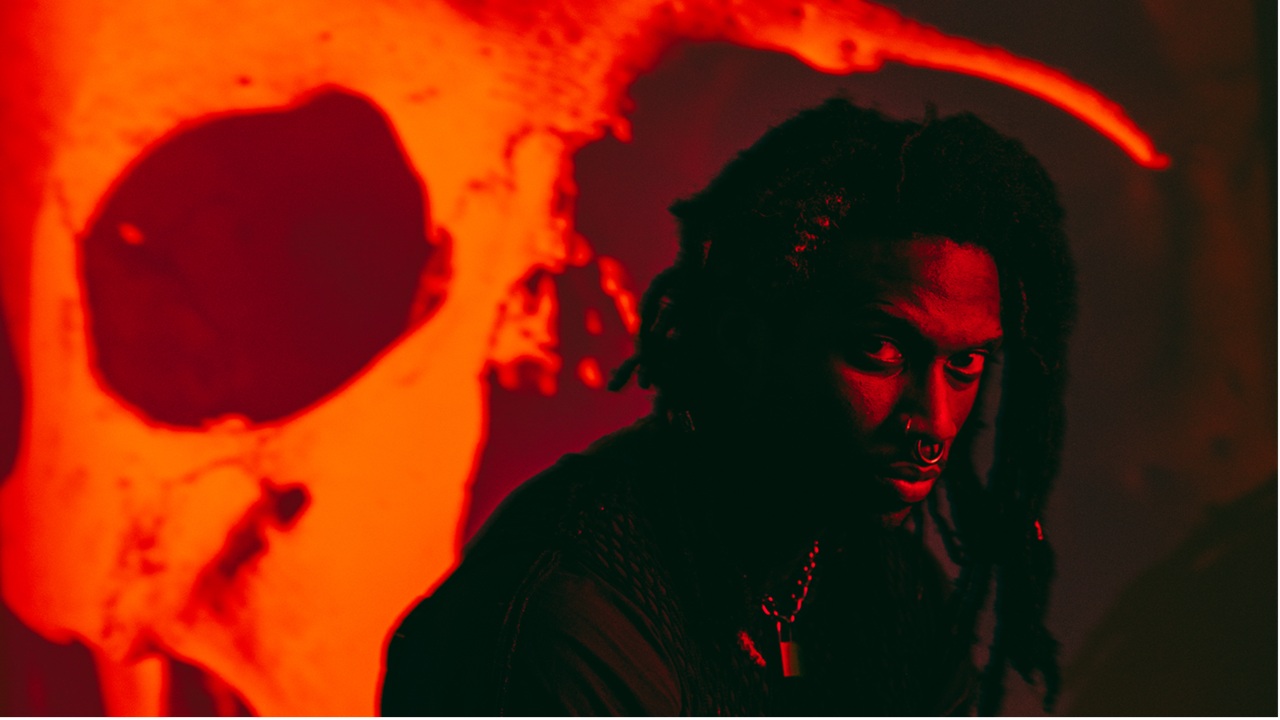"He walked through the airport wearing a soldier’s helmet, holding two massive boxes that said ‘GUNS’ on the side. The security said ‘What is in there?’ He said, ‘Guns! Can’t you read?!" Inside the top-secret HQ of Sabaton, power metal's biggest band
20 years on from their debut, Hammer joined Sabaton in their hometown of Falun to dive into the band's history
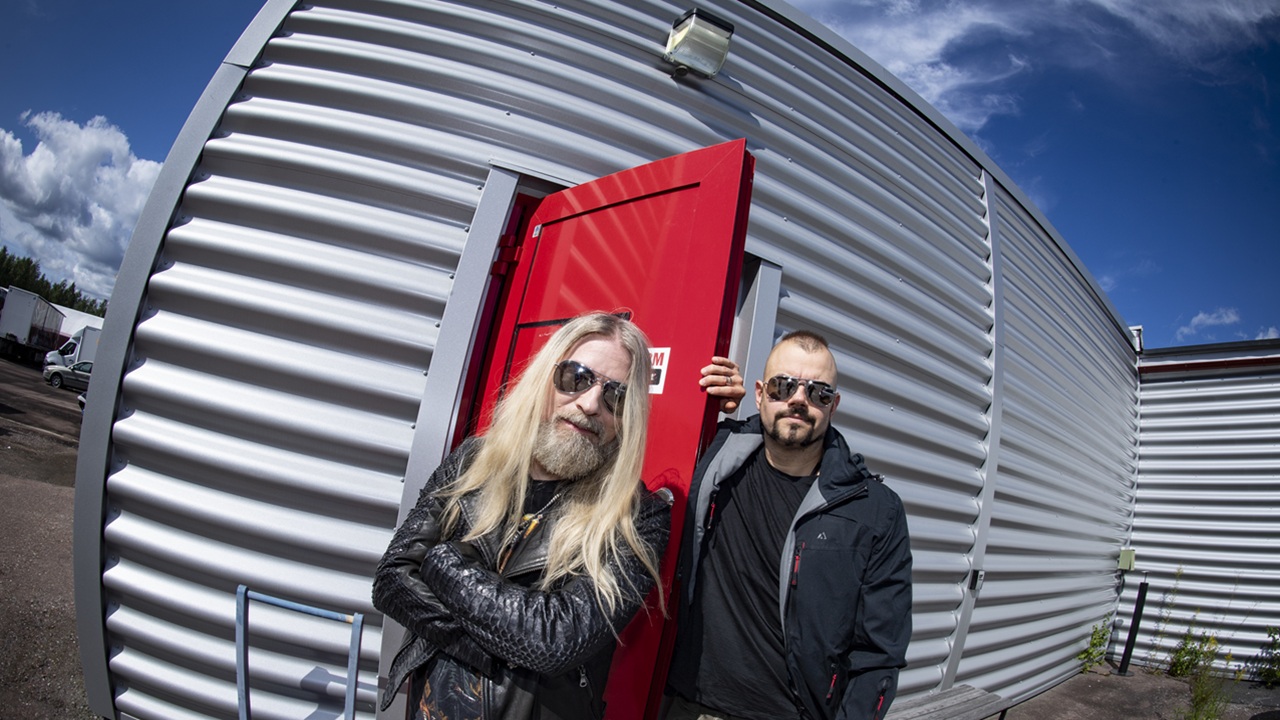
Select the newsletters you’d like to receive. Then, add your email to sign up.
You are now subscribed
Your newsletter sign-up was successful
Want to add more newsletters?

Every Friday
Louder
Louder’s weekly newsletter is jam-packed with the team’s personal highlights from the last seven days, including features, breaking news, reviews and tons of juicy exclusives from the world of alternative music.

Every Friday
Classic Rock
The Classic Rock newsletter is an essential read for the discerning rock fan. Every week we bring you the news, reviews and the very best features and interviews from our extensive archive. Written by rock fans for rock fans.

Every Friday
Metal Hammer
For the last four decades Metal Hammer has been the world’s greatest metal magazine. Created by metalheads for metalheads, ‘Hammer takes you behind the scenes, closer to the action, and nearer to the bands that you love the most.

Every Friday
Prog
The Prog newsletter brings you the very best of Prog Magazine and our website, every Friday. We'll deliver you the very latest news from the Prog universe, informative features and archive material from Prog’s impressive vault.
The Swedish city of Falun is beautifully picturesque. With its cobbled streets, large gothic-style church and – in a move that would surely enrage Alan Partridge – fully pedestrianised town centre, it’s a gorgeous area to causally stroll around in. There’s even a river to sit by and watch the world just flow past. What a lovely place to come and relax.
“It is, but, if you go fishing here, you must remember not to eat the fish,” warns Sabaton bassist Pär Sundström. “They’ve been polluted by the copper mines.”
The mines he’s talking about closed in the 1990s and are now a tourist attraction, but Pär can remember when they were still open. Sometimes the smoke was so thick, he says, that it was hard to tell if the sun was up or not. Even today, their toxic legacy lives on.
“The effects of the mines are everywhere,” Pär says. “I have an apple tree growing in my garden. If I ate one, it would make me sick. If I ate too many then I’d die.”
He pauses for dramatic effect, then delivers his copper-based zinger. “This entire town has been polluted by heavy metal.”
Of course it has, and it’s not just the mines he’s referring to. Pär and Sabaton singer Joakim Brodén grew up here and formed the band in 1999. Since then, they’ve become – with apologies to Lina Leandersson, star of the 2008 child-vampire classic Let The Right One In, or 2016 Olympic Gold medalist mountain biker Jenny Rissveds – the town’s most famous export.
Sabaton have released 11 studio albums to date, their most recent, Legends, released in October. The previous four of those have reached No.1 here in Sweden (Legends peaked at No. 2). More impressively, this bunch of camo-gear-clad war-and-history buffs – armed with a strain of unashamedly bombastic classic heavy metal, and pyro-heavy live shows that don’t resemble gigs so much as small wars – have transcended notions of ‘cool’ and ‘uncool’ to become bona fide stars outside the traditional battlegrounds of mainland Europe.
Sign up below to get the latest from Metal Hammer, plus exclusive special offers, direct to your inbox!
They’ve even steamrolled the UK and America into submission – they’re about to play their biggest-ever British headlining shows, including dates at London’s 20,000-capacity O2 Arena and Manchester’s 23,500-capacity Co-op Live.
It’s some achievement for a band that started life in this charming but unassuming outpost. Which is why Metal Hammer is here in Falun, getting a guided tour from Joakim and Pär as we explore their roots in this city of 37,000 people, and get to the heart of how they’ve been shaped by a place the singer says “really has nothing to do with what we do, but everything to do with how we do it”.
Pär is waiting for us in our hotel car park after we arrive in Falun following a three-hour drive from Stockholm, 140 miles south. The bassist balances a serious thoughtfulness with a friendliness and enthusiasm for whatever subject he’s talking about, especially when it comes to Sabaton themselves.
He lives in Cyprus these days (“There’s just so many more creative people there”), but many of his family and friends still reside here in Falun.
“In fact, see that flag behind you?” he says, pointing to the sign of a construction company working on a building next to the hotel. “That company is owned by the original drummer of Sabaton. His kid is starting a band with the son of our original guitarist. I keep trying to get my two boys involved so that we can get moving on Sabaton: The Next Generation!”
Our first stop is Sabaton’s HQ-cum-rehearsal room-cumstorage unit, on the outskirts of the city. From the outside, it looks like an anonymous building on an old industrial estate, but it houses more than 25 years’ worth of Sabaton history. Their very first tour bus (painted in camouflage colours, naturally) sits outside, as do three massive steel containers. What’s in them?
“The first one is…” he begins. “Actually, I think the second…” Another pause. “No, all three are filled with pyro and explosives.”
Inside, we meet Joakim and drummer Hannes Van Dahl. Leaving the latter to excitedly unpack a new drumkit he’s just taken delivery of, Pär and Joakim show us around the warehouse. It makes The Imperial War Museum look like a stripped-back yoga retreat; there are fake machine-guns and grenades, tank parts, gas masks, camouflage nets, bayonets… and two pinball machines?
“Those are mine!” says Joakim with a laugh. “I’ve got a GoldenEye one and a White Water one, plus one at home.”
If Pär is measured calmness personified, then Joakim is an excitable puppy. He speaks like a man with his finger on the trigger of a verbal Tommy gun, shooting words out at a million miles an hour in exactly the booming, resonant voice heard on every Sabaton album.
“I was suffering writer’s block, so I bought a pinball machine, just on a fucking spur of the moment thing,” he explains.
“When I need a reset from writing, I cannot have something that will take me down another rabbit hole and spend two hours on it – I need a five-to-20-minute break every now and then. Pinball demands your focus so you can’t really mentally be somewhere else, it clears your mind. Sort of like a wine drinker drinks water between testing wines, a palate cleanser or whatever. I’d like to bring one out on tour with me, but we make our crew carry enough fucking stuff already!”
He casually mentions that he was once ranked in the top 100 pinball players in the world. But much as we’d love to challenge him to a quick game – and probably get our arses handed to us on a plate – there’s too much other stuff to see to get sidetracked by a pinball competition. The pair continue to show us around the unit.
The walls are covered in framed gold records and posters from various tours and festivals, while the rails and rails of old tour costumes lend it the air of a military-themed fancy dress shop. Joakim shows us his keyboard. It’s been tricked out by the singer to look like a WWI plane – specifically that of Manfred von Richthofen, aka The Red Baron, subject of a song of the same name from Sabaton’s 2019 album The Great War.
They have a DIY ethic to match any underground punk band. Their very stage set wasn’t just repurposed from another band, it was actually salvaged from a swamp. The group in question were Swedish metallers Keen Hue.
“They were going to be a big band back in the late 80s, early 90s,” Pär explains. “They made this video for one of their songs, and it was just a load of goblins breaking into people’s houses and pissing in their gardens. Their American label didn’t think that could get on MTV, so they split up. They dumped their stage outdoors and it sunk into a swamp. Fast forward a few years and they said we could have it…”
“So all of Sabaton had to go and find this thing and dig it out of a fucking bog and clean it up!” continues Joakim with a grin. “It was a nightmare!”
As crazy as that sounds, it was no one-off. It seems like everything in the Sabaton lock-up has some kind of wild story attached to it. There are the massive chains stolen from Slipknot (“They felt too self-conscious to use them, so we took them,” says Pär) and a dismantled tank that the band once tried to take into Poland.
“Customs asked us what was in the crate,” says Pär, “We said it was a tank. They didn’t understand that we were entertainers… or how you put a tank back together every night.”
Then there are the microphone stands made out of machine-guns that nearly landed a friend of theirs in serious trouble.
“We needed these mic stands for a show in Europe, but they were being stored in the UK,” says Joakim. “We asked a friend of ours to bring them over. He walked through the airport wearing a soldier’s helmet, holding two massive boxes that said ‘GUNS’ on the side. The security said to him ‘Excuse me, what is in there?’ He said, ‘Guns! Can’t you read?!’ He was stuck in security for about four hours.”
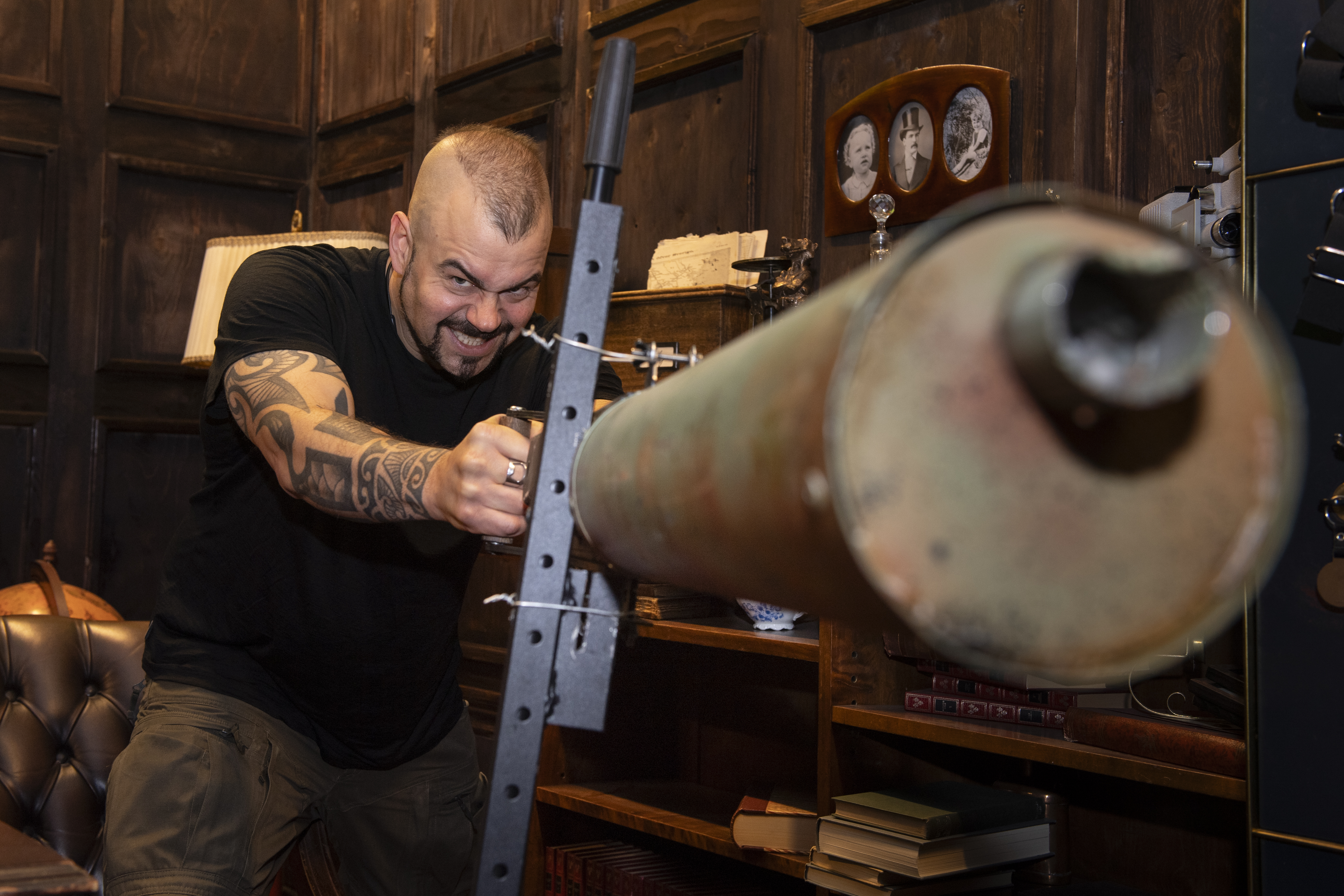


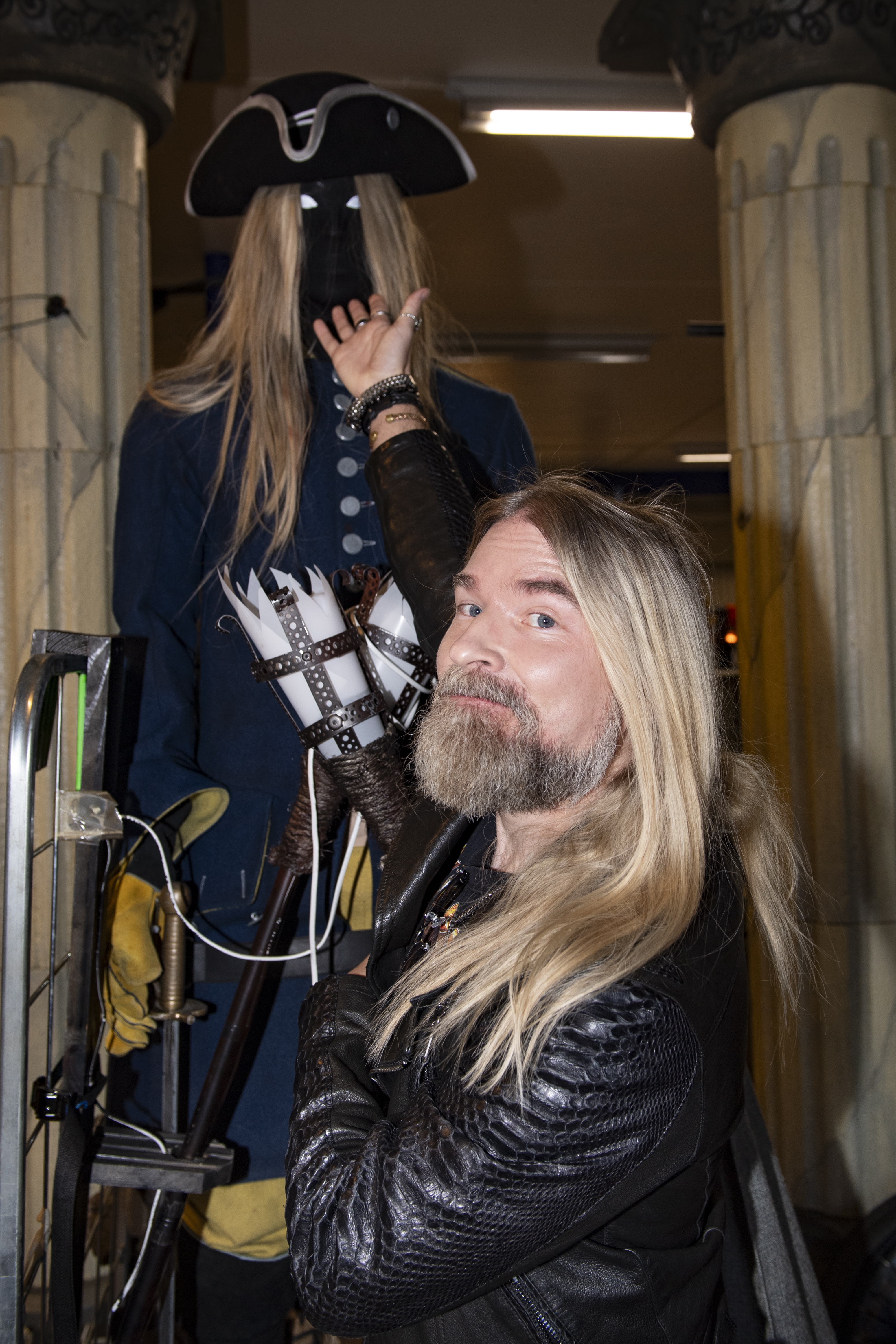
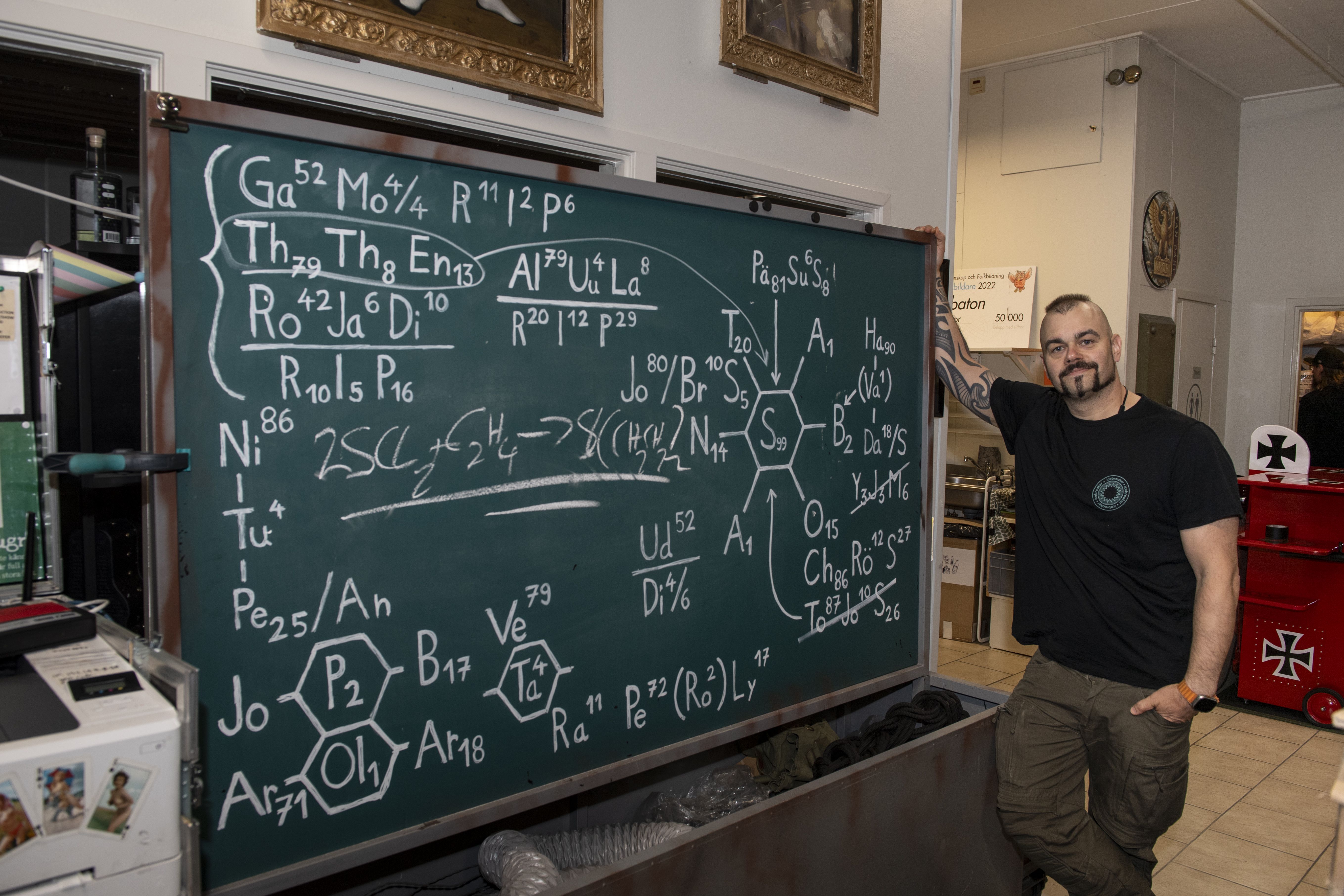
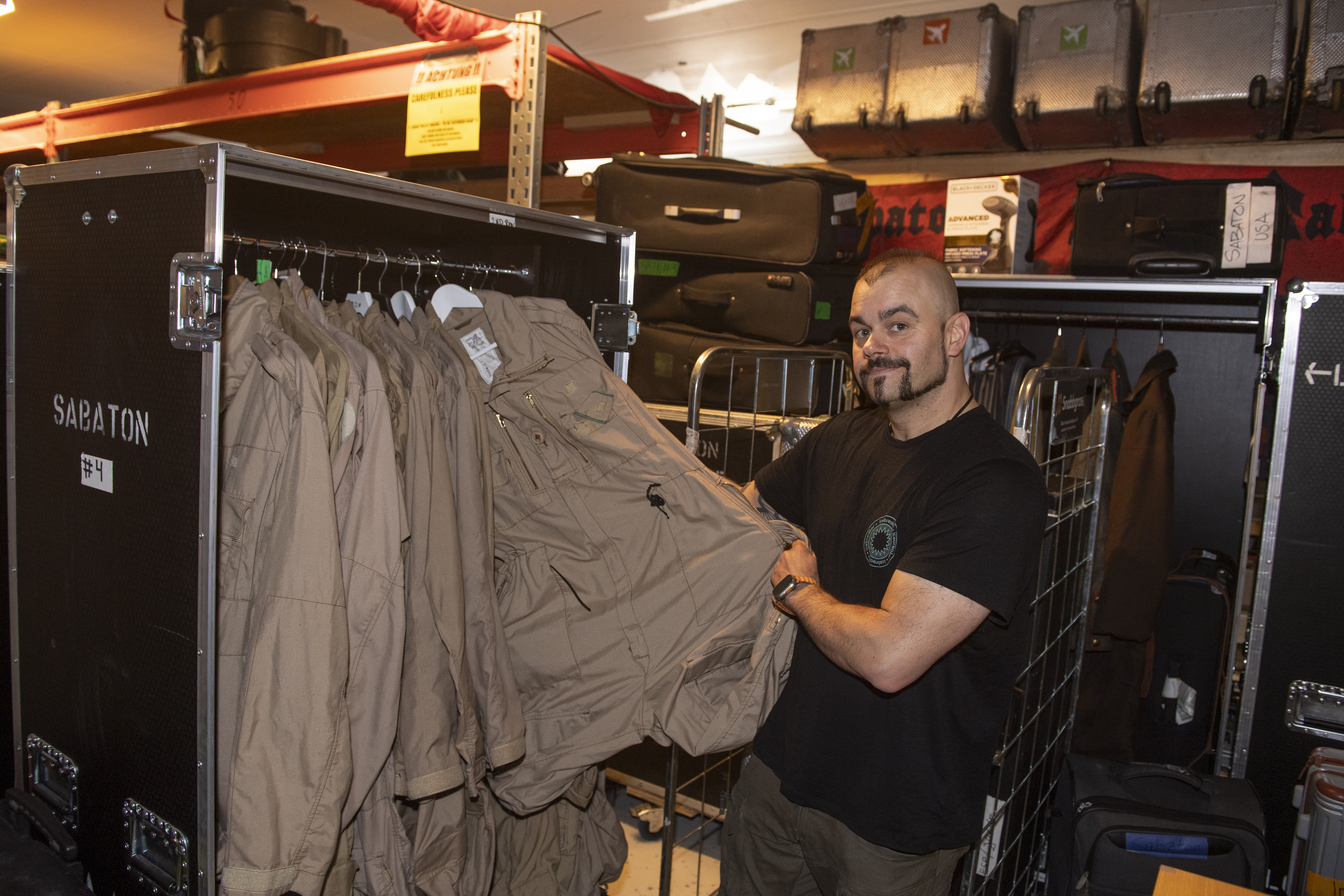
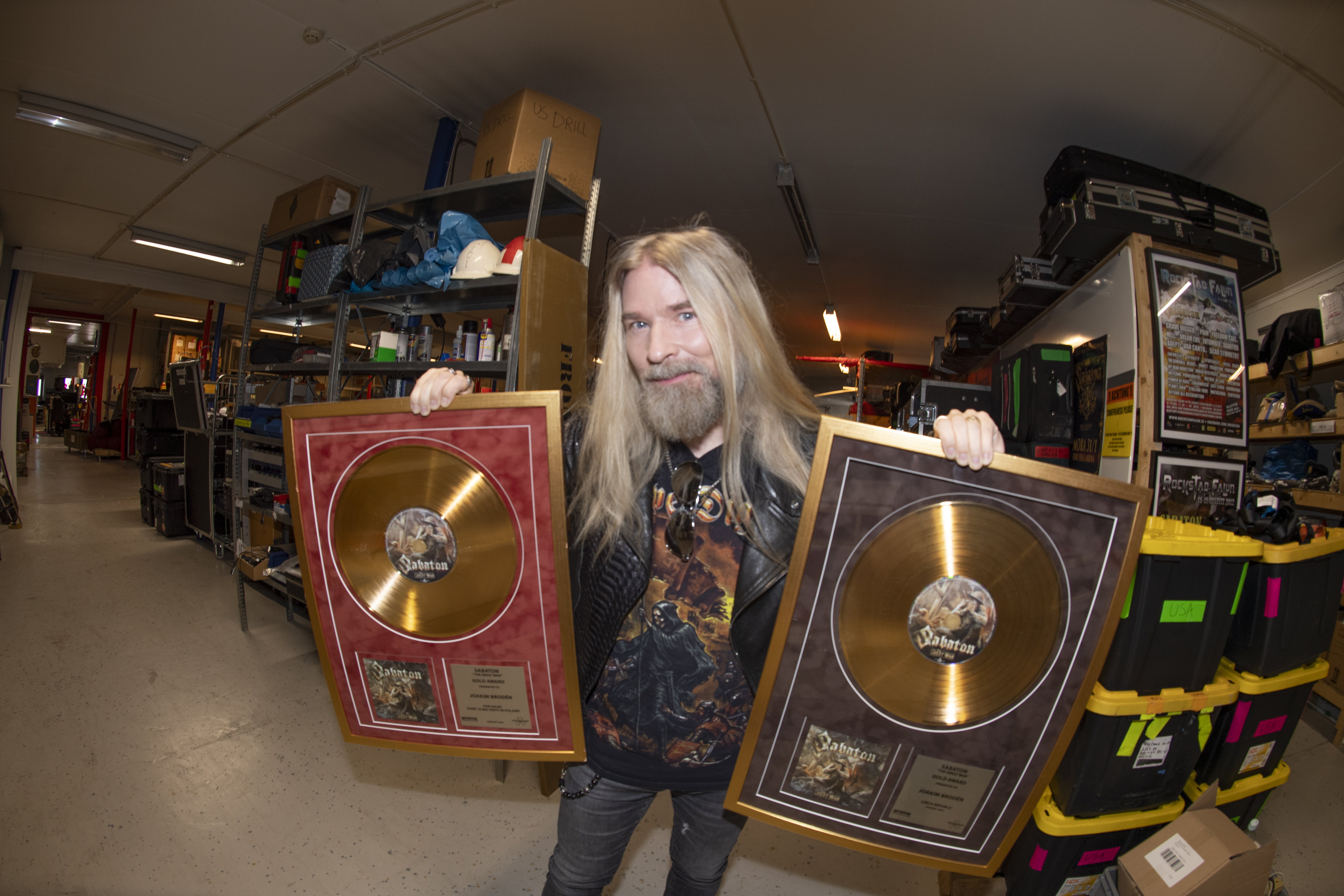
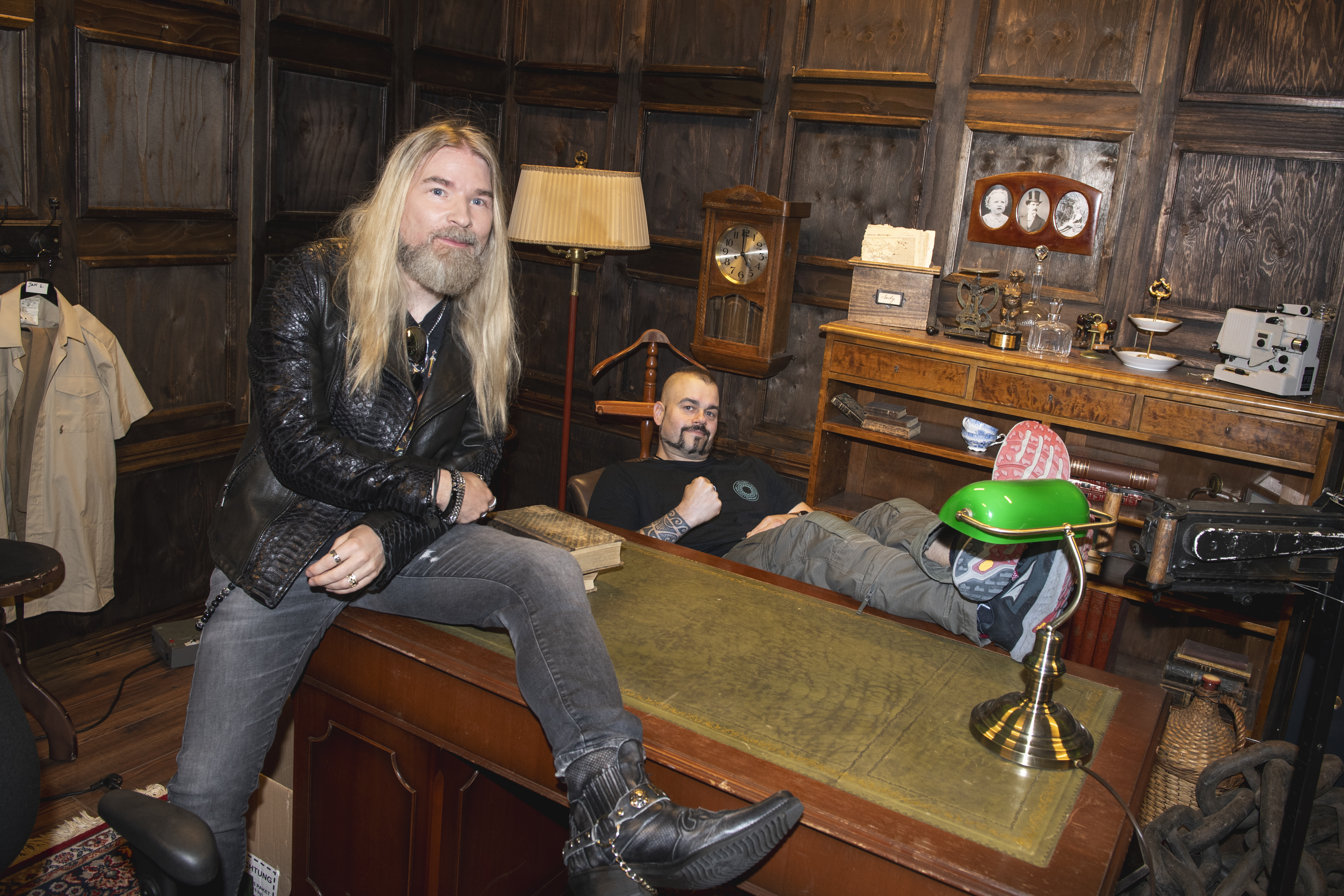
It’s lunchtime, and the pair know of the perfect place to eat. Leaving the lock-up, we drive back into the centre of Falun, to the city’s military barracks.
“A lot of people in the town eat here every day, because it’s subsidised by the government,” Joakim tells us. “It’s very cheap to eat here. It’s also a special day, because there are pancakes! They used to serve the soldiers pea soup, which is not especially exciting, so to cheer them up with a treat, on a Thursday they serve pancakes with jam and cream. We’ve been coming here for many years.”
As we sit down with a very delicious, very Swedish plate of meatloaf and potatoes, generously covered in gravy and fresh cranberry sauce, the pair give us a quick history lesson on Falun’s military background. It largely relates to those local copper mines.
“We needed a strong military presence here in Falun, because the money that came from the copper mines made Sweden a superpower in the 17th century,” Pär explains. “It was said that if Sweden was going to be attacked from, say, the Russians, then they would probably aim for here. So this town was mostly made up of miners, soldiers and probably prostitutes. I guess that presence has entered our subconscious as a band, maybe.”
It certainly has. All of their albums with the exception of 2007’s Metalizer (their third full-length record, though actually the first one they recorded) have centred around wars, conflicts and the people involved in them down the centuries. Some, such as 2005’s debut Primo Victoria and 2006’s Attero Dominatus cast their net wide, drawing on everything from WWII and Vietnam to the Falklands War and Iraq’s invasion of Kuwait in 1990.
Others have taken a more focused approach; 2008’s The Art Of War was inspired by 6th-century BC Chinese general Sun Tzu’s book of military strategy, 2012’s Carolus Rex charted the rise and fall of the Swedish empire in the 17th and 18th century, while 2019’s The Great War and 2022’s The War To End All Wars dug into the trenches of World War I.
Their new album, Legends, takes a different tack to its two immediate predecessors. Rather than concentrating on a specific conflict, each song spotlights a distinct historical figure: Genghis Khan, Joan Of Arc, Julius Caesar, the Knights Templar. It’s like a cross between The History Channel and Night At The Museum.
“We’ve been sitting on this idea for a very long time,” Joakim says. “We have a pile of album ideas. It all depends on the songs. These were the songs that we felt did the topic justice.”
It’s stirring stuff, for sure. But as with every Sabaton album, it conspicuously avoids addressing any of the current wars and conflicts currently raging across the globe. Why haven’t they covered those?
“Maybe we will, when the history books are written about those conflicts,” Joakim says defiantly. “We are passionate amateurs, but we are still amateurs. People have to understand, we are not a political band. Everybody wants to have an opinion, and save the world with their opinions, but that doesn’t change the world.
We are telling history, not political propaganda or religious propaganda. People are gonna have to get used to us not having opinions on conflict that’s unfolding right now. Because simply, we don’t know. Ask us again in 30 years when we read the history books.”
But surely you’re educated enough to have ideas about current situations?
“Listen, everybody lives in their own media bubble, everybody thinks they have the answer,” the singer fires back. “I get asked a question about these things, like you’re doing now, and I’m saying I don’t have an opinion, because I don’t know enough about it. It’s very often clear to me that I know way, way more than this person [asking the question], yet I still think I don’t have enough data to pass judgement. They have way less data but they’re ready to pass that judgment. I think we all should be a bit more humble before passing judgment.”
Meatloaf and pancakes polished off, we head out of the barracks. As we are leaving, Sabaton are stopped by a woman on the steps of the cafeteria. She gives Joakim and Pär a hug. This is Hannele, their former maths teacher at school.
“So, she has sung on every one of our albums since Primo Victoria,” Joakim says with a smile. “She’s been very supportive to us. Actually everyone has. This town has been good to us.”
In fairness, Sabaton have been pretty good to Falun as well. Our next stop is the site of Sabaton Open Air, the festival they founded in 2008 and ran until 2022 (Covid-ravaged 2020 and 2021 excepted). Situated in front of the Lugnet Hills ski jumping hill, this hometown spectacular drew in up to 10,000 people, to see a bill topped by Sabaton and an array of hand-picked bands (the likes of Amaranthe, Dark Tranquillity and Candlemass all played in various years).
“In 2017 Steve Harris’s British Lion played,” remembers Pär.
“I couldn’t believe it! We toured with Iron Maiden, and Steve said he wanted to come and play the festival. I actually said no at first! I told him, ‘This is only a small town, we don’t have the infrastructure for an artist like you!’ But he said, ‘I’ve seen the crowds, I’ll stay at any hotel you can offer me, and I’ve seen you have a Sabaton cheeseburger – I’ll eat that.’ And he came! It was an unbelievable honour for us.”
“The only thing he demanded was access to some sports,” says Joakim. He gestures to the nearby Lugnet sports complex. “As you can see, that’s the one thing we have plenty of here. So we closed off the swimming pool for him and he was happy as can be!”
We head back into the centre of Falun to see some of the places that Sabaton played as they were coming up. Sadly, many of the venues from their early years are long gone, such as Valhalla, a club next to the museum in the town square where the band made their live debut long before they began kitting themselves out in the camo gear. It’s sad, but it’s not really a surprise. Falun is many things, but a rock’n’roll town isn’t one of them.
“There used to be much more of a scene,” nods Pär. “We came through when there were plenty of bands and we had help from local people to print our flyers, to find us rehearsal spaces, to promote gigs. That’s not really here anymore.”
It turns out that there is actually a big gig happening at the weekend. Pär and Joakim want to show us the statue of 15th-century Swedish military leader Engelbrekt Engelbrektsson that stands in the town square, but it turns out that we can’t get close to it because a stage is being erected for a concert by new local heroes Bolaget. Apparently, this Falun-based band are a big deal.
“They play this new kind of music called ‘epadunk’,” says Pär. “The young kids love them. They drive around playing their music and smashing their hands on their cars. It’s like really aggressive EDM. All the lyrics are like, ‘Suck my dick, fuck you, motherfucking cunt!’”
They sound delightful. Do you have any plans to take them out on tour?
“It’s not really my cup of tea,” a diplomatic Joakim replies.
The stage is massive, though, they must be nearly as big as you guys.
“They’re pretty big,” says Pär with a dismissive shrug. “But internationally we’re far bigger.”
Their status as Falun’s favourite sons may be under threat from a bunch of local epadunk upstarts, but Sabaton are still well thought of enough here to be able to get us through the barriers and next to the statue of Engelbrekt. There’s got to be a song about this guy coming, right?
“Who knows?” grins Joakim. “There are a lot of history books out there! We’ll never run out of things to make songs about!”
Don’t you ever think about just writing a love song? They both laugh at the suggestion.
“No, no, no!” Joakim replies. “This is our passion. This isn’t a gimmick for us, this is what we love. I read and read and read, every history book I can get my hands on. Yes, it’s ‘work’, but it’s also what I’d be doing anyway.”
So what future ambitions do you have for Sabaton? How much further can you take this band?
“I still have dreams,” Joakim says, flashing a smile. “I would like to play Normandy Beach on [D-Day], the 6th of June. I want to put our stage on bunkers and have the fans coming. Do a gig on those historical sites on the day of an event, on the battlefield.”
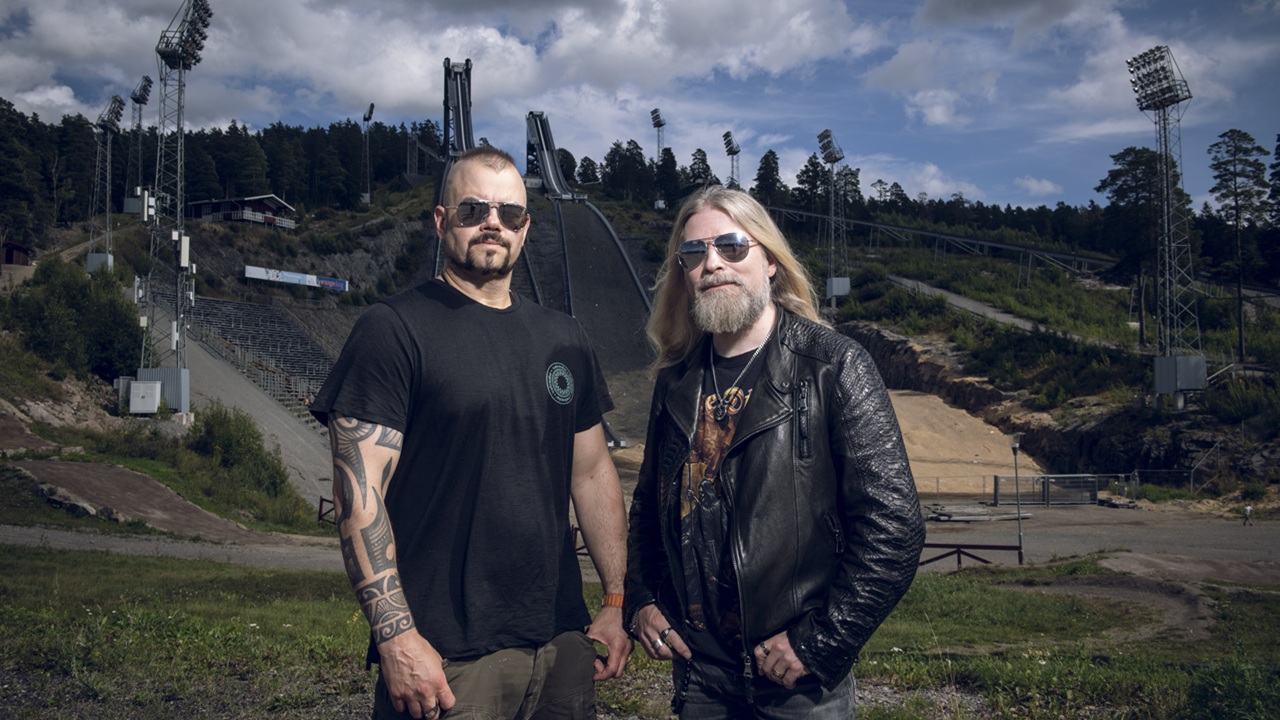
There’s just one more important stop to make: a local bar called Pitchers, where Joakim and Pär get the beers in.
“You asked me earlier about how this town shaped us,” Joakim muses as he takes a gulp from his glass. “I think that while we were definitely not inspired by music that came from this town, the work ethic, the discipline, the sense of community, all of that was instilled in us here.”
Not what you do, but how you do it.
“Exactly.”
As we drain our drinks, head to our car and start our journey back to the UK, we get a big hug from Joakim and Pär and have one last look at Falun, the place that birthed Sabaton. Quiet, charming, leafy. And completely polluted by heavy metal.
Sabaton's UK tour begins on December 4. For the full list of upcoming dates, visit their official website.
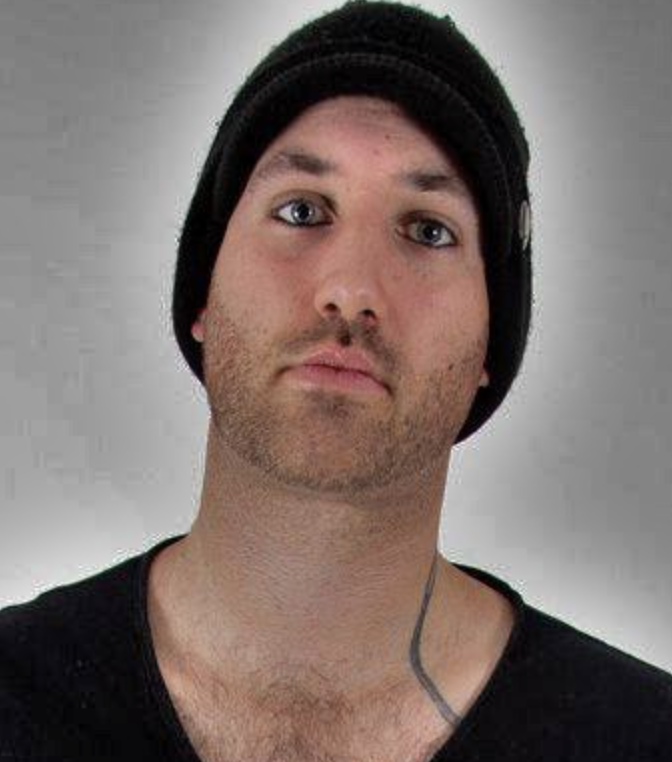
Stephen joined the Louder team as a co-host of the Metal Hammer Podcast in late 2011, eventually becoming a regular contributor to the magazine. He has since written hundreds of articles for Metal Hammer, Classic Rock and Louder, specialising in punk, hardcore and 90s metal. He also presents the Trve. Cvlt. Pop! podcast with Gaz Jones and makes regular appearances on the Bangers And Most podcast.
You must confirm your public display name before commenting
Please logout and then login again, you will then be prompted to enter your display name.


